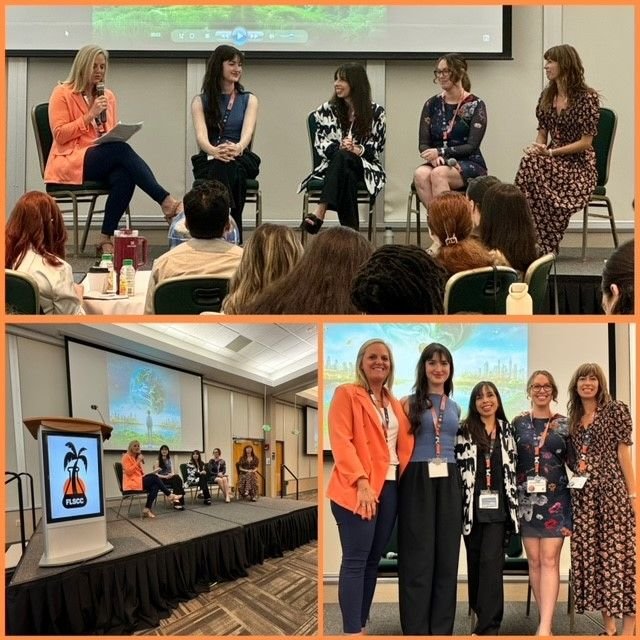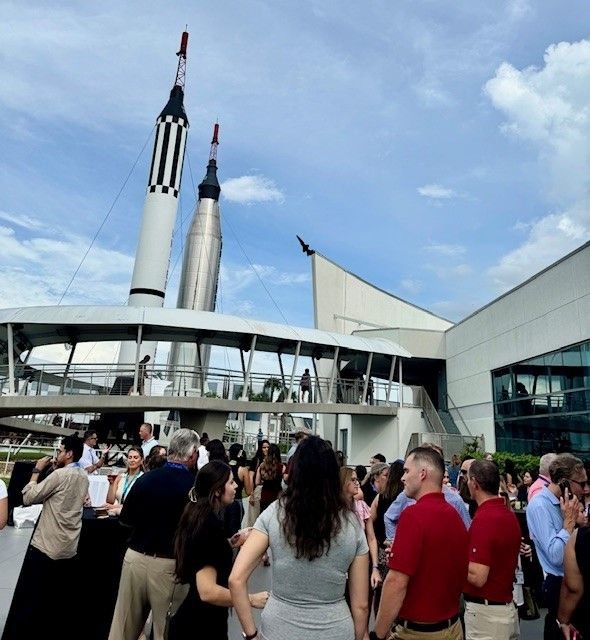flscc sustainability countdown
… kicked off the day at The Kennedy Space Center for The FLSCC (Florida Society of Cosmetic Chemists) event, where sustainability was the pivotal topic of the day, bringing together industry professionals to explore innovative practices in cosmetic formulation and environmental responsibility.
The panelists tackled big questions, like:
What is sustainability?
What does sustainability mean to you?
One panelist, Valerie George, summed it up perfectly: “sustainability is a give and take. As priorities shift, so does the approach to being greener. And, we can anticipate a new conversation around this in 5 years.”
To help brands along the way, the panel emphasized the importance of certifications, which helps build trust with the consumer. But it was clear that newer companies don't fully understand the certifications or the raw materials in their products, making education key all around.
Without certifications, companies need to provide well-documented proof of their sustainability claims to gain consumer confidence.
Also touched on was the 12 principles of green chemistry as a useful guide for brands trying to navigate this space.
overall take away on sustainability….
There’s no one perfect way to be a sustainable brand. While many supply chains aim to become more sustainable, it’s not always easy, and companies are constantly adjusting their priorities as new challenges and solutions arise.
photo credit: FLSCC
When it came to packaging sustainability, the panelists agreed that many consumers see the issue in black-and-white, when in reality, it’s far more complex. Retail requirements can complicate things because they often lack clear reasoning and real data, potentially leading us off track.
Noted during the conversation around packing is that no one brand is doing things perfectly; we're all just doing our best.
Aluminum, for example, is more recyclable but also more expensive than plastic. However, exciting new materials like seaweed-based plastics are on the horizon. There’s no "magic solution" for making packaging 100% sustainable, and it’s a moving target that’s constantly evolving.
photo credit: FLSCC
Following the panel discussions sustainability presentations were given by:
Macro Oceans: Redefining Sustainability in Beauty: Macro Oceans' Fully Traceable, Carbon-Negative Solutions presented by Matthew Perkins (Founder & CEO)
Expanscience: From Regenerative Sourcing to Waste Reduction: Sustainable methods to make a real positive impact on the planet and the cosmetic industry presented by Laure-Ann Gillon (Director)
To The Moon!
NASA engineer Kurt Leucht has outlined an ambitious plan for NASA’s partnership with SpaceX to return humans to the Moon and establish a long-term presence.
The first mission to land humans on the lunar surface is scheduled for 2026, using the Orion space capsule. This mission will kick off a series of initiatives aimed at advancing lunar exploration.
Key elements of NASA's lunar strategy include:
Artemis Base Camp: NASA plans to establish a base camp on the lunar surface by the 2030s, where astronauts could live and work. While it may not be a fully self-sustaining "space station," it will provide a foundation for longer stays and exploration.
Lunar Gateway: Construction of the Lunar Gateway, a space station that will orbit the Moon, is expected to begin by 2023. The Gateway will act as a crucial hub for astronauts, enabling travel between lunar orbit and the Moon’s surface. NASA envisions it playing a central role in Moon missions by 2030.
Rover Deployment: NASA plans to deploy an open rover to the lunar surface in 2029 to support exploration. By 2031, a more advanced pressurized rover will be introduced, allowing astronauts to travel farther from the base and live on the Moon for several weeks.
SpaceX will play a critical role by positioning a fully fueled Starship in lunar orbit. This Starship will ferry astronauts between the Lunar Gateway and the Moon’s surface, acting as the primary lander.
The timeline for these projects is dependent on funding, technology, and international collaboration. A fully built, permanent station on the Moon is more likely to be realized in the mid-2030s and beyond. The NASA-SpaceX partnership is paving the way for sustainable lunar exploration.
The event finished with Speed Networking with attendees and suppliers.
photo credit: FLSCC
Raw material suppliers held a fun networking event to showcase their latest technologies. They engaged attendees with quizzes, offered samples of new concepts, and encouraged lively discussions. The event was interactive and left everyone feeling energized and excited about new possibilities.
The Florida SCC sustainability event at the Kennedy Space Center was a resounding success—engaging, educational, and so well-attended that even the waitlist couldn't accommodate everyone.
The high demand highlights the growing interest in sustainability within our industry, and we look forward to continuing the conversation in future events.





